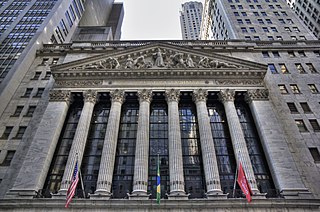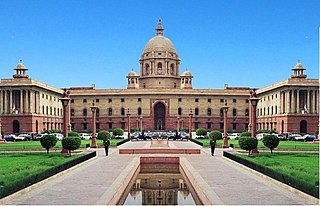
A societas Europaea is a public company registered in accordance with the corporate law of the European Union (EU), introduced in 2004 with the Council Regulation on the Statute for a European Company. Such a company may more easily transfer to or merge with companies in other member states.

A stock exchange, securities exchange, or bourse, is an exchange where stockbrokers and traders can buy and sell securities, such as shares of stock, bonds, and other financial instruments. Stock exchanges may also provide facilities for the issue and redemption of such securities and instruments and capital events including the payment of income and dividends. Securities traded on a stock exchange include stock issued by listed companies, unit trusts, derivatives, pooled investment products and bonds. Stock exchanges often function as "continuous auction" markets with buyers and sellers consummating transactions via open outcry at a central location such as the floor of the exchange or by using an electronic trading platform.

Business is the activity of making one's living or making money by producing or buying and selling products. Simply put, it is "any activity or enterprise entered into for profit."

A security is a tradable financial asset. The term commonly refers to any form of financial instrument, but its legal definition varies by jurisdiction. In some countries and languages people commonly use the term "security" to refer to any form of financial instrument, even though the underlying legal and regulatory regime may not have such a broad definition. In some jurisdictions the term specifically excludes financial instruments other than equities and Fixed income instruments. In some jurisdictions it includes some instruments that are close to equities and fixed income, e.g., equity warrants.

A stock market, equity market, or share market is the aggregation of buyers and sellers of stocks, which represent ownership claims on businesses; these may include securities listed on a public stock exchange, as well as stock that is only traded privately, such as shares of private companies which are sold to investors through equity crowdfunding platforms. Investment is usually made with an investment strategy in mind.
A mutual fund is a professionally managed investment fund that pools money from many investors to purchase securities. The term is typically used in the United States, Canada, and India, while similar structures across the globe include the SICAV in Europe and open-ended investment company (OEIC) in the UK.

A joint-stock company is a business entity in which shares of the company's stock can be bought & sold by shareholders. Each shareholder owns company stock in proportion, evidenced by their shares. Shareholders are able to transfer their shares to others without any effects to the continued existence of the company.
A real estate investment trust (REIT) is a company that owns, and in most cases operates, income-producing real estate. REITs own many types of commercial real estate, including office and apartment buildings, warehouses, hospitals, shopping centers, hotels and commercial forests. Some REITs engage in financing real estate.
Stamp duty is a tax that is levied on single property purchases or documents. A physical revenue stamp had to be attached to or impressed upon the document to show that stamp duty had been paid before the document was legally effective. More modern versions of the tax no longer require an actual stamp.

A private limited company is any type of business entity in "private" ownership used in many jurisdictions, in contrast to a publicly listed company, with some differences from country to country. Examples include the LLC in the United States, private company limited by shares in the United Kingdom, GmbH in Germany and Austria, société à responsabilité limitée in France, and sociedad de responsabilidad limitada in the Spanish-speaking world. The benefit of having a private limited company is that there is limited liability. However, shares can only be sold to shareholders in the business, which means that it can be difficult to liquidate such a company.

The Shanghai Stock Exchange (SSE) is a stock exchange based in the city of Shanghai, China. It is one of the three stock exchanges operating independently in mainland China, the others being the Beijing Stock Exchange and the Shenzhen Stock Exchange. The Shanghai Stock Exchange is the world's 3rd largest stock market by market capitalization at US$7.62 trillion as of July 2021. It is also Asia's biggest stock exchange. Unlike the Hong Kong Stock Exchange, the Shanghai Stock Exchange is still not entirely open to foreign investors and often affected by the decisions of the central government, due to capital account controls exercised by the Chinese mainland authorities.

The Warsaw Stock Exchange (WSE), Polish: Giełda Papierów Wartościowych w Warszawie, is a stock exchange in Warsaw, Poland. It has a market capitalization of PLN 1.05 trillion.

Hong Kong Exchanges and Clearing Limited operates a range of equity, commodity, fixed income and currency markets through its wholly owned subsidiaries The Stock Exchange of Hong Kong Limited (SEHK), Hong Kong Futures Exchange Limited (HKFE) and London Metal Exchange (LME).

The Ministry of Finance is a ministry within the Government of India concerned with the economy of India, serving as the Treasury of India. In particular, it concerns itself with taxation, financial legislation, financial institutions, capital markets, centre and state finances, and the Union Budget.
The Kazakhstan Stock Exchange is a stock exchange located in Almaty, Kazakhstan. The exchange was founded in 1993.
Bangladesh is a common law country having its legal system developed by the British rulers during their colonial rule over British India. The land now comprises Bangladesh was known as Bengal during the British and Mughal regime while by some other names earlier. Though there were religious and political equipments and institutions from almost prehistoric era, Mughals first tried to recognise and establish them through state mechanisms. The Charter of 1726, granted by King George 1, authorised the East India Company to establish Mayor's Courts in Madras, Bombay and Calcutta and is recognised as the first codified law for the British India. As a part of the then British India, it was the first codified law for the then Bengal too. Since independence in 1971, statutory law enacted by the Parliament of Bangladesh has been the primary form of legislation. Judge-made law continues to be significant in areas such as constitutional law. Unlike in other common law countries, the Supreme Court of Bangladesh has the power to not only interpret laws made by the parliament, but to also declare them null and void and to enforce fundamental rights of the citizens. The Bangladesh Code includes a compilation of all laws since 1836. The vast majority of Bangladeshi laws are in English. But most laws adopted after 1987 are in Bengali. Family law is intertwined with religious law. Bangladesh has significant international law obligations.
A Business Development Company ("BDC") is a form of unregistered closed-end investment company in the United States that invests in small and mid-sized businesses. This form of company was created by Congress in 1980 as amendments to the Investment Company Act of 1940. Publicly filing firms may elect regulation as BDCs if they meet certain requirements of the Investment Company Act.

In finance, stock consists of all of the shares into which ownership of a corporation or company is divided. A single share of the stock means fractional ownership of the corporation in proportion to the total number of shares. This typically entitles the shareholder (stockholder) to that fraction of the company's earnings, proceeds from liquidation of assets, or voting power, often dividing these up in proportion to the amount of money each stockholder has invested. Not all stock is necessarily equal, as certain classes of stock may be issued for example without voting rights, with enhanced voting rights, or with a certain priority to receive profits or liquidation proceeds before or after other classes of shareholders.
The Finance system in Azerbaijan consists of government policy and arrangements for borrowing and lending and the transfer of assets. The system is composed of banks, insurance companies, other financial institutions, pension system, financial markets and payment systems.